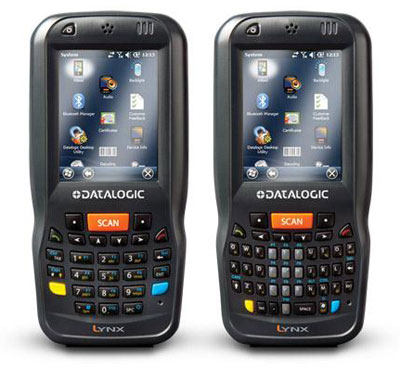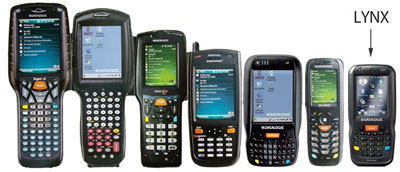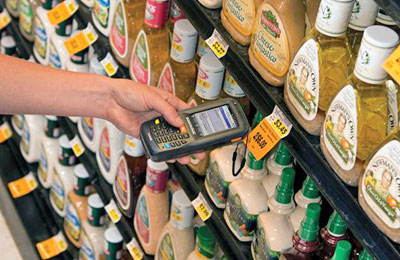The Datalogic Lynx PDA was introduced late 2012 as a small and handy mobile pocket computer for sales reps and retail managers, but also suitable for work outdoors. With a footprint no larger than one of today's consumer smartphones, the Lynx combines enterprise-class data capture and connectivity with consumer-level voice and data capabilities.

Datalogic, of course, already has an exceptionally comprehensive lineup of handheld terminals ranging from the the full-size Kyman and Falcon X3, to the smaller flashlight-handheld Skorpio, the full-size Pegaso PDA, the thumb-type Elf PDA, and the Memor that looks like a pre-iPhone cellphone. The Lynx can probably be best described as a somewhat smaller version of the Datalogic Elf.

The Lynx is 5.6 inches long, 2.6 inches wide, and an inch thick thick. It weighs 9.5 ounces, making the device thicker and heavier than smartphone, but it's still remarkably small and light by industrial handheld standards. The resistive touch screen display of the Lynx PDA is small, just 2.7 inches diagonally. According to Datalogic, it's powered "by a new technology that improves readability indoors and outdoors." Resolution is 240 x 320 pixel QVGA — enough for a display this small.
Keyboard/keypad layouts can make or break the usability of a handheld terminal, and so Datalogic offers the Lynx with two different layouts, a numeric version with 27 keys, and an alphanumeric version with a 46-key QWERTY layout keypad. The former lends itself to rapid numeric data input with its large keys, the latter is more conducive for frequent text entry. Each version also has navigational keys and a large orange scan key.
On the processor side, Datalogic stayed with the tried-and-true Marvell XScale PXA family. The 806MHz PXA310 is plenty powerful enough for this sort of device. RAM and Flash are 256MB and 512MB, respectively, with additional storage available via an SDHC-supporting microSD card slot. For operating system software, Datalogic chose Windows Embedded Handheld 6.5 (which the Datalogic brochure amusingly describes as "the latest Microsoft operating system." Not.). There's pre-licensed Wavelink terminal emulation and Wavelink Avalanche, as well as Datalogic desktop, firmware and configuration utilities.
As a device primarily geared towards retail, the little Lynx isn't ultra-rugged, but definitely rugged enough for the intended jobs. The Lynx has an operating temperature range of 32 to 122 degrees Fahrenheit, so no commercial freezer work here. The drop spec is an adequate four feet. Sealing is at the IP54 level. That means the unit is protcted against dust and water spray from all directions, but limited ingress is permitted. That'll do for warehouse and light outdoor duty.

Datalogic handhelds are about rapid reliable data capture and communication, and so the Lynx comes with Cisco CCX v4 certified WiFi, Class 2 Bluetooth, and either a laser scanner or a 1D/2D imager. It can also be equipped with a 3-megapixel autofocus camera with LED flash. 3G/4G HSPA+ mobile broadband allows real-time wide area communication, and assisted GPS facilitates location-based applications.
With the Lynx PDA, Datalogic very clearly signaled that it continues to bet on legacy PDA hardware and software technology as opposed to adopting the iPhone/Android-style consumer smartphone platform with projected capacitive multi-touch and more modern OS software. For now, that's not necessarily a bad choice.



